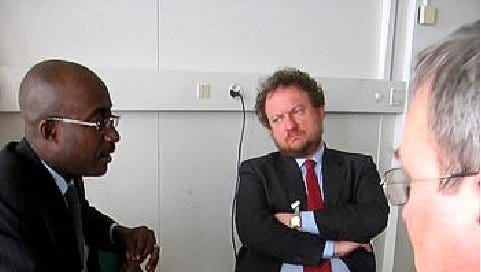What Happens After Democracy Collapses?
Let’s face it, democracy is falling apart around the world.
In previous blog posts I have identified who and what I think is behind this collapse, but whatever the cause it’s progressed past the point of no return.
A particular experience gives me some perspective on what’s happening.
What’s really happening
On May 22, 2008 I gave a presentation to the United Nations World Summit on Information Society about Osmio, which was (and is) the continuation of the International Telecommunication Union’s World e-Trust Initiative. World e-Trust was an ID-PKI certification authority positioned as source of governance for the online world. After years of development, the e-Trust Initiative was unceremoniously dumped by a 2004 vote of the ITU’s member state representatives. The City of Osmio, its successor, had then been chartered at the ITU’s Geneva Headquarters on March 7, 2005 to continue its work independent of the ITU but inheriting its duly constituted public authority.
No one was saying why World e-Trust had been killed, but we all knew the reason.
The “why” was finally articulated by a member state rep who came up to me after my 2008 talk and, in an agitated tone of voice said “Wes, we never talked this way because we didn’t want to come across as Luddites, but when the internet was new we [meaning MS reps] viewed it as a massive threat to our national sovereignties. Your World e-Trust Initiative was like internet squared. That’s why we killed it.”
I thanked him for being the first to at last come out and speak the obvious.
It all started in 1865
The nation-state, the notion of a sovereign jurisdiction bounded by imaginary lines on a map, has been on a path to obsolescence since 1865. That’s when the ITU was founded to – get this! – reconcile the differing views of nations toward encryption of telegrams.
In 1865!
Since then the telegraph, then telephone, then old x.25 networks, then email, then Gopher and the Web, then social media have been regularly insulting those proud national boundaries by ignoring them as their bitstreams whiz by. When China tries to impose its “great firewall,” savvy Chinese high schoolers simply get around it with a VPN.
Now, Donald Trump, Viktor Orban, Marine LePen, Michael Flynn and all the other Putin stooges and sycophants are making the nation-state obsolescent, if not obsolete. Putin thinks he’s killing democracy but he’s really just finishing the job of erasing those lines on the map.
Still, the area on the map representing Trump’s domain – before adding Canada, Greenland and Panama that is – the jurisdiction which represents less than five per cent of Earth’s population, presumes to impose laws and regulations governing artificial intelligence, social media, and on and on. Imagine being an AI developer in Indonesia and thinking, “why does this similar-sized country think its laws and regulations apply to me?
It’s reminiscent of the UK in the late 19th century acting as though Britannia actually still ruled (not just) the waves.
An example of governmental obsolescence
In the U.S. state of Massachusetts there is still something called county government. It’s assumed that in the distant past Massachusetts county government actually existed for a reason, that it actually did something – but now it survives purely on inertia. No one knows what it does.
If you want to understand the role of the nation-state after Trump et al get done with it, take a look at the role of Massachusetts county government.
What comes next?
Municipalities will continue to thrive because our physical beings all need to live somewhere. But the real successor to the nation-state will be the online community, thousands of which have taken hold in Discord, FUTO, Mastodon, Bluesky, Reddit – and of course in the gamer communities. Right now they continue to lack the accountable anonymity that was part of the social media of the 1980s – but after we fix that they’re be much better places to hang out.
.
About the Author
In 1981 Wes Kussmaul, working with friends at the MIT Joint Computer Facility, created the world’s first online encyclopedia, implemented using what he calls “the world’s worst business model.” Over the the next year the addition of social features transformed the encyclopedia into the more sustainable Delphi social network, which in 1993 was sold to Rupert Murdoch’s News America Corp.
Wes is the author of four books about bringing accountability with privacy back to social networks. One of those books caught the attention of a group at the ITU, a United Nations agency, while it was building a global PKI-based source of trust that resembled what the book advocated. Wes announced its re-launch as The City of Osmio in a 2008 presentation to the United Nations World Summit on Information Society. Wes is also the creator of Stoanova, an approach to Stoicism as it applies to problem solving.
Wes is the founder of The Authenticity Institute, a provider of a PKI platform to licensed Authenticity Enterprises, which may be seen here. The outcome of the work of those Authenticity Enterprises may be seen at Authentiverse.





So, what about manufacturing? What about supply chains? What about agriculture? What about housing?
My perspective is that anything that can go thru a cable is of secondary importance to me. Sure, it's important, but only secondary. Let's not have the tail wagging the dog.